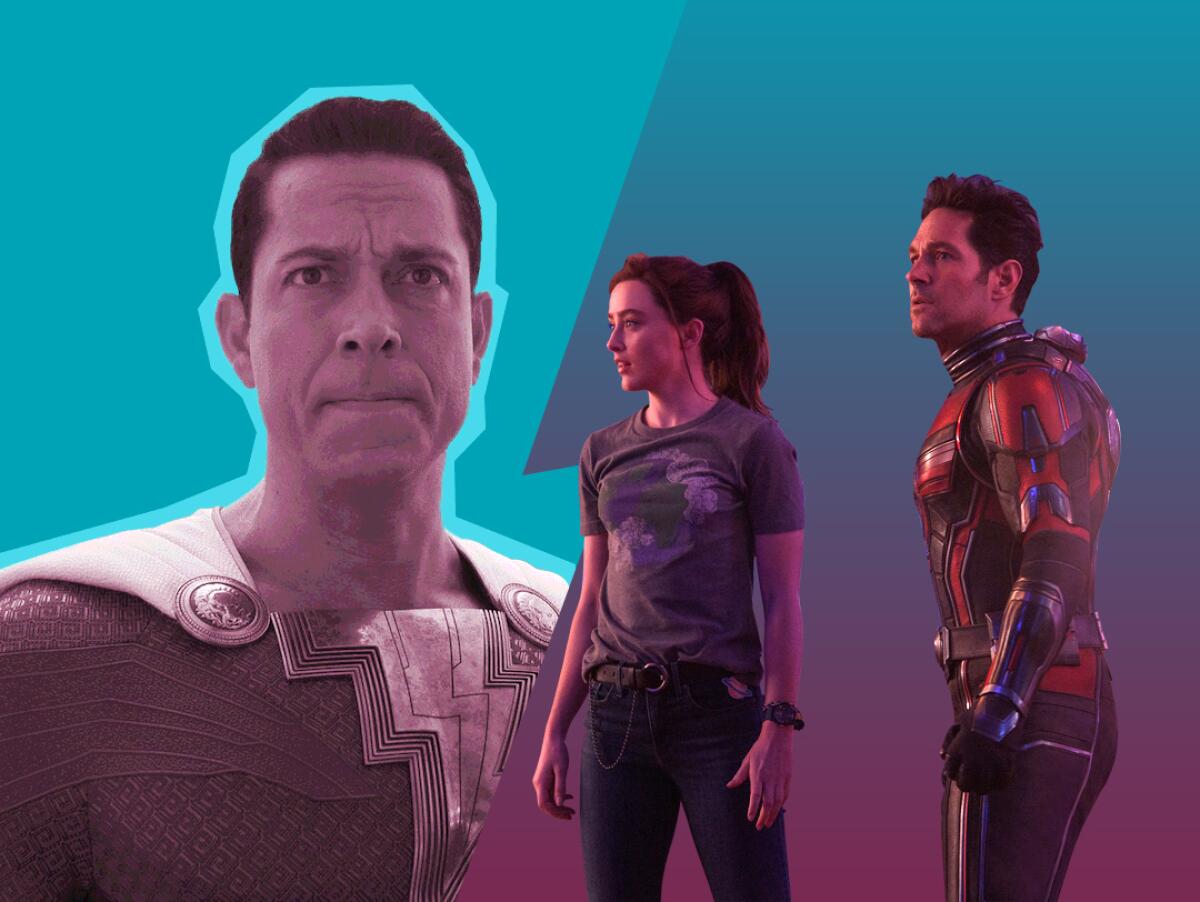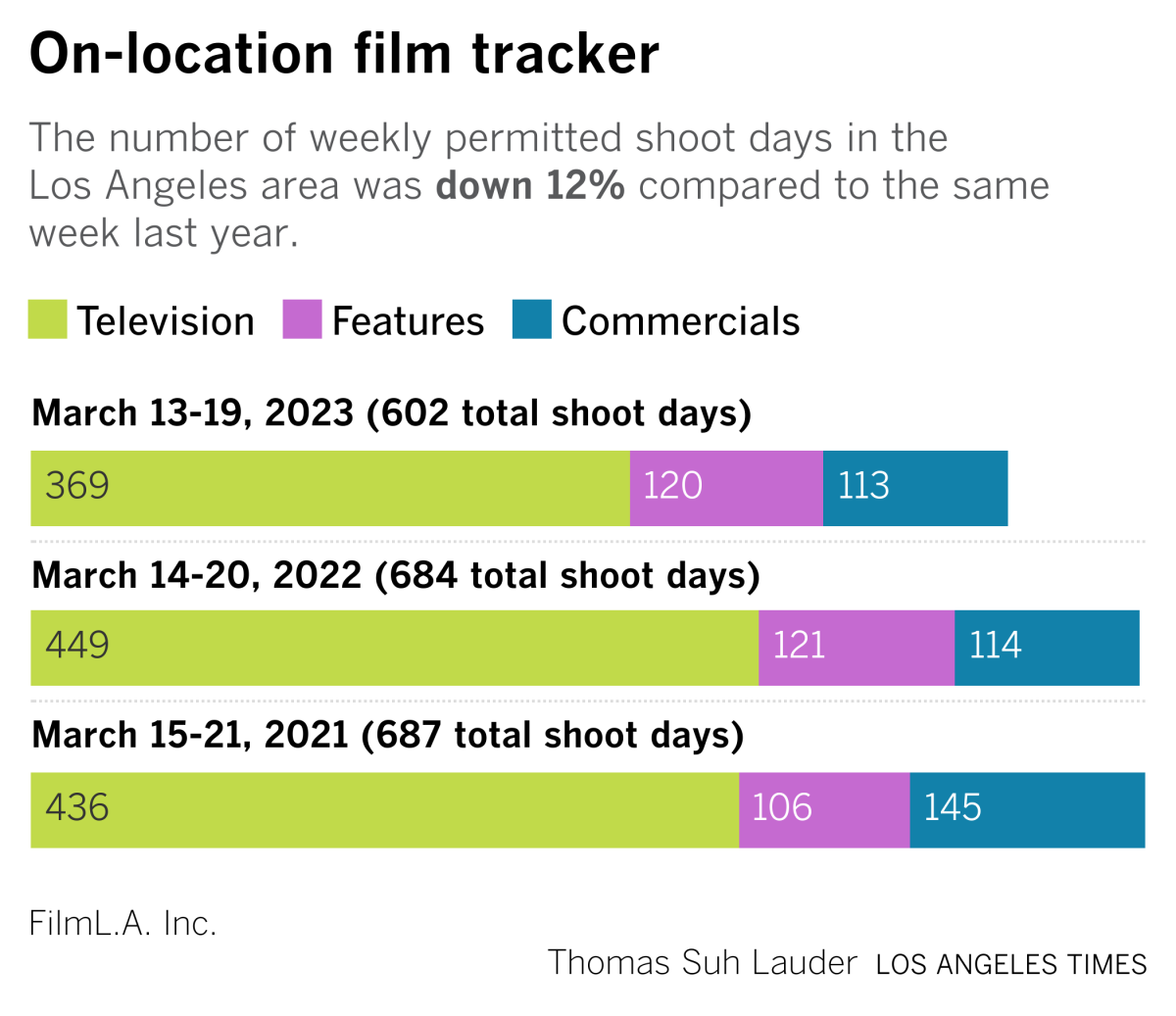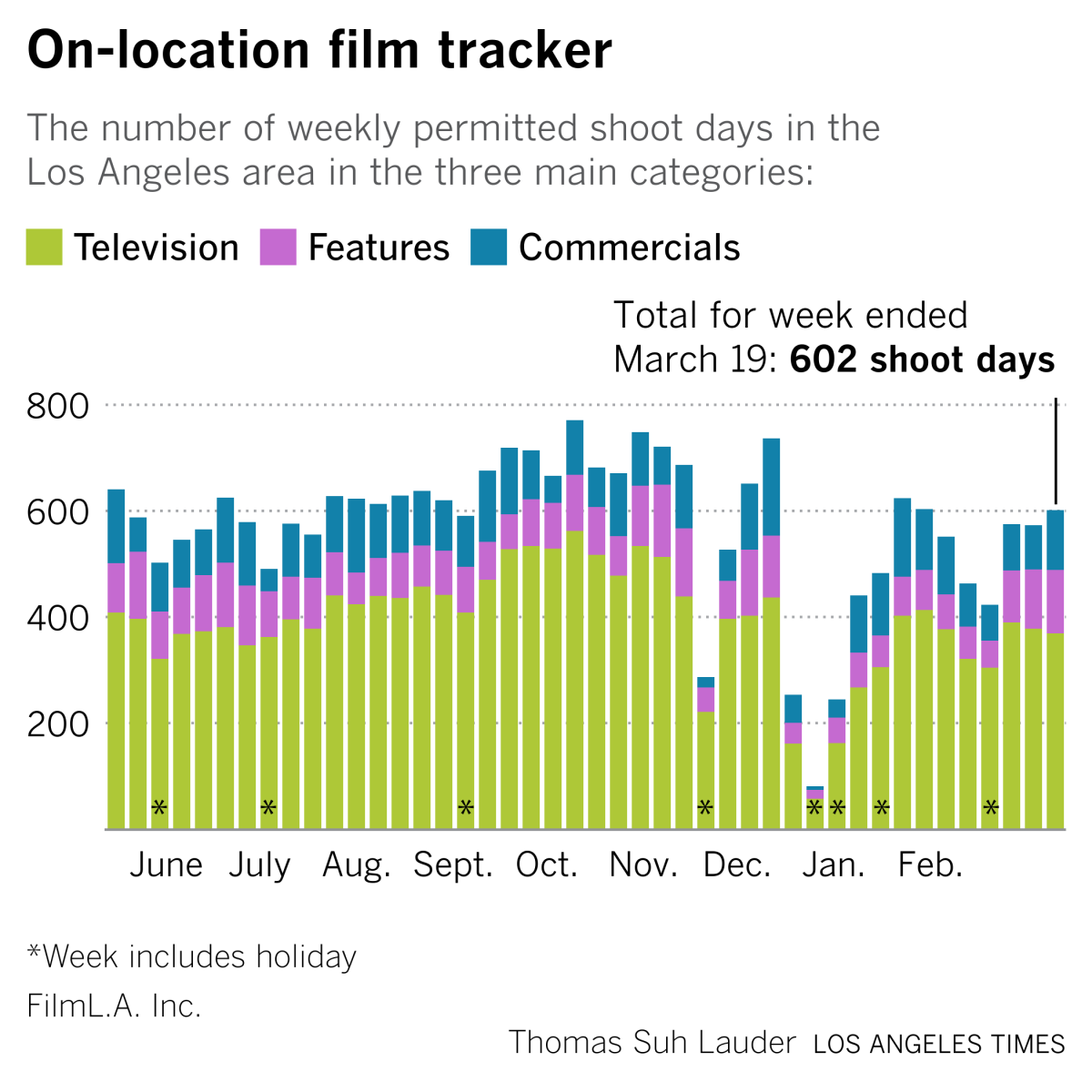It’s not just ‘Shazam!’ Hollywood superhero movies have a quality problem

Welcome to the Wide Shot, a newsletter about the business of entertainment. Sign up here to get it in your inbox.
There are plenty of reasons why DC’s latest film offering, “Shazam! Fury of the Gods,” performed poorly, grossing just $30.5 million in the U.S. and Canada.
Reviews were brutal for the production with an estimated $125-million budget. And maybe there just wasn’t that much interest in a “Shazam!” sequel to begin with. The original “Shazam!” opened with a solid $53 million, but it wasn’t quite a runaway hit, ending up with $140 million domestically for a so-so 2.6x multiple from its debut.
It may have just been plain difficult to get DC fans to care.
“Shazam!,” starring Zachary Levi, was always a little outside the main DC galaxy, and the sequel was a holdover from the previous Warner Bros. regime and doesn’t play into the future of the franchise, making it a bit of a lame-duck casualty of a shift in strategy.
That situation makes it tough for audiences to invest time in a movie, even with millions in studio marketing behind it (though there’s been some grumbling around town that Warner Bros.’ media spending kicked in too late).
Superhero fans want interconnected stories, which was the case that James Gunn and Peter Safran were making to Warner Bros. Discovery long before taking charge of DC.
But there’s a wider issue at play: Superhero movies have a serious quality-versus-quantity problem.
After the dismal box office results last weekend, I kept flashing back to comments Gunn made to entertainment industry journalists in January to explain his vision for the future of DC.
One of the most refreshing parts of that talk, given on the Warner Bros. lot in Burbank, was Gunn’s admission that superhero sameness in Hollywood is a real thing that matters, and not a mirage vexing only the originality-starved film critics wandering the industry’s desert of blockbuster creativity.
“Superhero fatigue can be real, once the movies start to get repetitive and too much like each other,” Gunn said during the Q&A session, after laying out his and Safran’s plans for DC Studios and their expanding film and television universe.
The genre can’t sustain itself by telling the same stories — “good guy, bad guy, giant thing in the sky” — over and over, the “Guardians of the Galaxy” filmmaker said. Superhero movies need more moral complexity. They need films that “don’t just pretend to be different genres” but actually are comedies, horror movies and dramas that happen to involve superpowers.
Beyond variety, quality control is also an important factor, as we’ve talked about previously with challenges at Marvel that started to show during its Phase 4. If audiences keep getting mediocre superhero content because studios are stretching themselves like Silly Putty to fill streaming services and theaters with more and more stuff, that’s going to hurt the art form.
Kevin Feige’s previously unassailable operation at Disney has, since the end of the Infinity Saga, fielded some true critical misses, including the recent “Ant-Man and the Wasp: Quantumania” and, to a lesser extent, “Thor: Love and Thunder.” The quality of Marvel’s VFX and the crunch to get the films made has lately become a focal point of criticism.
Opening weekend grosses for Marvel movies remain basically critic-proof, as far as anyone can tell, but the latest “Ant-Man” suffered a 70% drop the weekend following its debut.
Longtime Marvel executive Victoria Alonso, who was in charge of visual effects and postproduction, recently departed the studio, Disney confirmed Monday. No reason was given for her exit, a rare example of high-level turnover at Feige’s shop.
Yes, Marvel is still the film industry’s most successful operation. Even so, it matters if the movies are good, though if it doesn’t always seem so at first. At some point, the loss of goodwill from fans hurts business, as we saw from the diminishing returns of Warner Bros.’s Zack Snyder era. Even DC’s “Batman v Superman: Dawn of Justice” and the first “Suicide Squad” did big business despite terrible notices. The fallout didn’t really happen until later.
The dire need to get it right is why DC isn’t taking any chances on “Superman: Legacy,” with the studio officially confirming last week that Gunn will direct the movie for July 2025, in addition to writing the screenplay.
Gunn spoke at the January event about the importance of making sure the scripts are in top form before shooting, rather than putting hundreds of millions of dollars into a film when “a screenplay is only two-thirds of the way done and we have to finish it while we’re making the movie.”
That kind of rushed production, followed by costly reshoots, is driven by a need to hit release dates set out months and years in advance. Gunn called this the primary reason for the “deterioration” in quality of films during the last couple of decades, while noting that it’s not just a superhero problem.
Asked how much is riding on the new Superman flick — the first standalone Clark Kent/Kal-El movie since 2013’s “Man of Steel” — Gunn responded, “A lot.” There’s an eight-to-10 year plan on the line here, and entertainment companies have a mixed track record setting up interconnected franchises without first building on successful, beloved movies.
Even Marvel didn’t do that much planning, at least at the beginning.
This is a time of dramatic, much-needed transition for DC. There’s a reason DC’s new leaders are willing to push back on heavyweights including Patty Jenkins, Henry Cavill and Dwayne Johnson, the latter of whom spoke during the “Black Adam” press tour about the direction of the DC franchise as if he were confident he would have a big part in it.
Gunn and Safran still have some inherited movies to get through before 2025. DC has its $200-million “The Flash” coming in June after it premieres at CinemaCon next month. Gunn called it “probably one of the greatest superhero movies ever made” and there will surely be some interest in the controversial Ezra Miller element.
Sure, “Fury of the Gods” suffered from falling into the liminal space between the Jason Kilar-Ann Sarnoff era of Warner Bros. (where, according to Gunn, “no one was minding the mint” and intellectual property was passed out like “party favors”) and whatever the DC Universe looks like under the new David Zaslav-approved management team.
But if the movies just aren’t very good, there’s not a lot that corporate strategic planning can do with them.
Stuff we wrote
— Here we go: Writers enter tense contract negotiations with Hollywood studios. The talks between writers and studios are being closely watched as many in Hollywood fear that this year’s contract renegotiation could lead to a strike.
— Is AI the future of Hollywood? How the hype squares with reality. At SXSW, the annual summit of tech boosters, all eyes turned to A.I. — and, in particular, what the emerging sector means for entertainment.
— What Netflix’s Nancy Meyers drama says about the state of the Hollywood rom-com. Netflix pulled out of “Paris Paramount” after disagreements over the budget. What price makes sense for the romantic comedy genre in 2023? Now Warner Bros. is looking to pick up the project.
— His L.A.-based podcast company faced a crossroads. Now Jesse Thorn’s employees are owners. Despite getting offers from large conglomerates to sell his podcasting business, the host of “Bullseye With Jesse Thorn” — sort of a millennial “Fresh Air” with Terry Gross — is choosing to sell his company to his employees.
— The nation’s biggest regional sports network owner files for Chapter 11 bankruptcy. Sinclair’s Diamond Sports Group said it would continue to televise live games on its Bally Sports channels during bankruptcy proceedings. The unit’s struggles represent the clearest sign yet of the unraveling of how local sports are broadcast.
— Jen Psaki will now ask the questions on MSNBC. The former press secretary for President Biden takes on a new role as a Sunday cable news host of a show that will also be available on NBC’s Peacock streaming service.
— ABC’s Oscars telecast scores biggest audience since 2020 with 18.8 million viewers. The scandal over last year’s slap, and crowd-pleasing best picture winner “Everything Everywhere All at Once,” brought more TV viewers to this year’s event.
Number of the week

Another week, another massive tech company staffing reduction. Amazon on Monday announced 9,000 job cuts on top of the 18,000 it previously disclosed.
Amazon Studios is not taking the hit here. Instead, workers are getting cut at cloud computing unit Amazon Web Services (Chief Executive Andy Jassy’s previous fiefdom), advertising, HR and, Twitch, the streaming platform for live video game-playing watch-alongs and other web video programming.
Clearly this has a lot to do with the broader struggles in the tech sector amid the postpandemic burn-off and a slowdown in advertising. Facebook owner Meta also recently reported a second round of cuts, eliminating 10,000 positions.
Twitch is cutting about 400 jobs. “Like many companies, our business has been impacted by the current macroeconomic environment, and user and revenue growth has not kept pace with our expectations,” new Twitch CEO Dan Clancy wrote in a blog post.
Amazon bought Twitch for $970 million in 2014 as a way to engage with the growing world of gaming and esports. But while Twitch has grown, it hasn’t exactly become Amazon’s YouTube. Twitch’s previous CEO, Emmett Shear, quit last week to take on an advisory role, saying he wanted to be at home to raise his son.
Best of the web
— Tilda Swinton is over COVID on-set masking rules. (Variety)
— Missed this one earlier this month: Behind the making of “Shakespeare in Love.” (Air Mail)
— At center of Fox News lawsuit, Sidney Powell and a “wackadoodle” email. (Washington Post)
— Haters gonna hate: Taylor Swift’s $150-million real estate empire. (Wall Street Journal)
— Kal Penn talks “Daily Show” hosting duties and comedy: “I don’t have to apologize for loving sophomoric humor, or for reading The Economist.” (Esquire)
Films shoots
Latest on-location shooting data from FilmLA.


Finally ...
Every time “The Wire” star Lance Reddick showed up in a movie or TV show — whether in the “John Wick” franchise or “Lost” — the project was better because of his presence. He died Friday at 60.
The Wide Shot is going to Sundance!
We’re sending daily dispatches from Park City throughout the festival’s first weekend. Sign up here for all things Sundance, plus a regular diet of news, analysis and insights on the business of Hollywood, from streaming wars to production.
You may occasionally receive promotional content from the Los Angeles Times.




